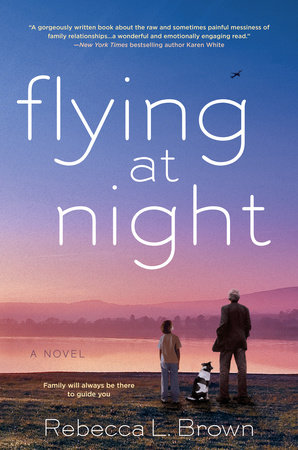READERS GUIDE
Flying at Night
Rebecca L. Brown
Questions for Discussion
1. Flying at Night uses three very different viewpoints to tell the story of the Whitman-Hart family. Do you think the novel would have been as powerful with just one or two of the voices? Do you think that the three narrators complement each other in a way that is integral to the narrative or is it more of a style choice? The Silver Eagle’s voice is heard in two segments before the catastrophic event he undergoes; then we hear from Lance instead. What do you think the significance of this change is?
2. Flying at Night is separated into three parts: Autumn, Winter, and Spring. Why do you think the author chose to divide the book up this way? How do these seasons reflect the events of the section or further illuminate them? What would a fourth part, Summer, look like? What do you imagine would take place in that section?
3. The book opens with Piper describing Fred’s early childhood, up to the point where the action begins, when Fred is nine years old. What was your reaction to Piper in this first section? How did you feel about her relationship with Fred? Her husband, Isaac? Her father, Lance?
4. Piper coming to terms with Fred’s autism diagnosis is central to the plot of Flying at Night. Did Piper’s reaction to this experience feel realistic to you? Did you understand her conflicting emotions toward Fred? Her fear for his future?
5. Did you like the sections told from Fred’s point of view? Did they feel authentic? What did they add to the story? Why do you think Fred and Lance interacted so well?
6. Piper often speaks of Isaac’s physical and emotional absence from their family life. Do you think that his important social justice work with the falsely imprisoned means he should have less responsibility in his family life? Did his frequent absences play a part in his decision to give his young son a knife? Does Isaac understand Fred? As well as Piper?
7. Judy’s decision to give up care of her husband is a turning point in the novel. Do you agree with her decision? If you were Piper, would you have handled their confrontation in the hospital differently?
8. Piper decides to take her father home with her to recover after seeing the conditions of the nursing home Judy chose for him. Did you understand why she brings her father home to live with her family, even when she finds him so difficult? Is it the right decision? Is there another way she could have solved the problem?
9. What do you think the significance of the crack in the ceiling of Lance’s bedroom is? Why does the author return to it multiple times? Do you think the crack is a symbol of something else? If so, what?
10. When tidying up Lance’s room, Piper finds a sheaf of drawings that he penned. She is surprised, because she didn’t know that her father could draw or enjoyed it. What is the importance of the scene where she confronts him with the drawings? Is it a turning point in their relationship or how she feels about him?
11. Do you think the dog Chuck Yeager is an important character in the story? What is his purpose?
12. There are several points in the novel where Lance puts his life at risk. Why do you think he does that? Do you think that he intends to hurt himself or is it a result of his brain injury?
13. How did you feel about the conclusion of Flying at Night? Would you consider it a happy ending? What do you think Piper and Isaac’s relationship will look like going forward? Do you think they will stay together? If so, why? Do you think that Piper and her mother will ever repair their relationship? Piper seems to accept how things end between them. How do you feel about this?
14. What are the themes of Flying at Night? Are any of them stronger than others? Which one do you connect to the most?

